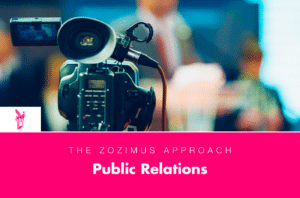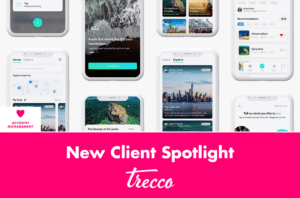Informational Search Queries Take the Cake, or Pie
There is so much we can learn about a user by the way they search: hobbies, demographic, income range, gender, habits, age and health, just to name a few. For e-commerce, one very important factor we use search behavior to determine is where the user is in the buying cycle. So, what are search queries and what do they tell us about consumer behavior? There are three different types of search queries, all of which are fairly self-explanatory:- Navigational – the user already knows where they want to go. For example, when I’m using my phone I’ll look up “Facebook” in the search browser as opposed to typing in the url.
- Transactional – the user has an idea of what they’re looking for and there is usually intent to make a transaction. When I search for “Victoria Secret swim suits” or even “summer bathing suits,” I am likely considering buying a swim suit soon.
- Informational – the user is simply seeking more information. This is the broadest query and tells us the least about a consumer’s purchasing intent. They are conducting research, unsure yet of what they will buy or even if they want to buy. These queries typically take the form of questions, for example “what to do in Boston this summer” or “how to get rid of a rug stain”. The user may be looking for a cool event to purchase tickets for, or simply researching which free festivals they can attend. Similarly, in the second example, the user may be interested in buying a stain-removal product, or they may just be looking for a home remedy.
Who has the biggest slice of the pie?
Think about the last time you Googled something. What was it? Why were you searching for it? Chances are that you made an informational search query. Informational queries are increasingly dominating the search world and they should, in turn, leave marketers in search of new strategies.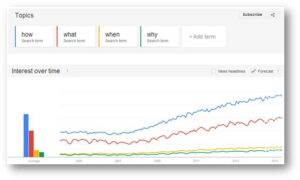 According to Google Trends, informational queries, especially those including “how” and “what,” have increased exponentially in the past three years, signaling a shift in the way people are using search engines.
Today, almost 80% of queries are informational, while the remaining 20% is divided between navigational and transactional queries. That’s a big slice of the search behavior pie. A little over a decade ago, informational queries only accounted for about 48% of queries. This shift in search habits indicates that an increasing number of people are in the research stage when they use search engines. They are at the beginning of the consumer buying cycle, the very top of the sales funnel. Now, what does this mean for you? Whether you’re a marketer, a small business owner, or a Pokémon card seller, this trend changes the way you obtain traffic, and in turn, customers.
According to Google Trends, informational queries, especially those including “how” and “what,” have increased exponentially in the past three years, signaling a shift in the way people are using search engines.
Today, almost 80% of queries are informational, while the remaining 20% is divided between navigational and transactional queries. That’s a big slice of the search behavior pie. A little over a decade ago, informational queries only accounted for about 48% of queries. This shift in search habits indicates that an increasing number of people are in the research stage when they use search engines. They are at the beginning of the consumer buying cycle, the very top of the sales funnel. Now, what does this mean for you? Whether you’re a marketer, a small business owner, or a Pokémon card seller, this trend changes the way you obtain traffic, and in turn, customers.
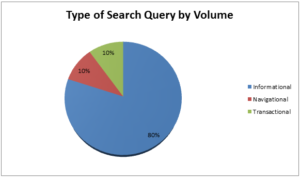 People no longer have to take a brand’s word that their product or service is the best choice – they want more information about the problem they are trying to solve and they want opinions from other users too. Social media and technological advances like Google’s semantic search make getting opinions and finding answers easier than ever. You don’t even have to click a mouse, just ask Siri.
Marketers are beginning to catch on, pouring money into Pay-Per-Click (PPC) advertising and SEO. According to Google’s 2013 10-K Report, revenues from advertising reached a monstrous $50.5 billion, increasing from $43.6 billion in the previous year and $36.5 billion in 2011. That’s about a 38% increase in just two years. And our Google Trend research suggests that billions more have yet to be spent.
People no longer have to take a brand’s word that their product or service is the best choice – they want more information about the problem they are trying to solve and they want opinions from other users too. Social media and technological advances like Google’s semantic search make getting opinions and finding answers easier than ever. You don’t even have to click a mouse, just ask Siri.
Marketers are beginning to catch on, pouring money into Pay-Per-Click (PPC) advertising and SEO. According to Google’s 2013 10-K Report, revenues from advertising reached a monstrous $50.5 billion, increasing from $43.6 billion in the previous year and $36.5 billion in 2011. That’s about a 38% increase in just two years. And our Google Trend research suggests that billions more have yet to be spent.
How do we help our clients leverage the trend?
The SEO team at 451 regularly analyzes search query data for our clients in Webmaster Tools to help them learn more about their audience and to create meaningful content. Here’s what we do: 1. Click ‘Search Traffic’ and then click ‘Search Queries on the drop down menu.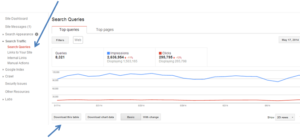 2. Download the CSV version of the table, then format the data as a table in excel.
3. Create a text filter in the ‘Queries’ column that contains “what” or “how”. Now, it should look like these:
2. Download the CSV version of the table, then format the data as a table in excel.
3. Create a text filter in the ‘Queries’ column that contains “what” or “how”. Now, it should look like these:
 Looking at our clients’ search query data, we realized that more and more traffic is now coming from visitors asking these types of “how” and “what” questions – informational queries. Using this data, we help our clients optimize metadata, keywords, paid advertising, social media, content, and on-site user experience to influence and increase conversions.
Looking at our clients’ search query data, we realized that more and more traffic is now coming from visitors asking these types of “how” and “what” questions – informational queries. Using this data, we help our clients optimize metadata, keywords, paid advertising, social media, content, and on-site user experience to influence and increase conversions.
How YOU can optimize?
Become a content machine. Because most consumers are in the research stage, as opposed to farther along in the buying cycle, it’s essential that you generate quality content to attract leads to your site and thus your product or service. The golden rule here: quality over quantity. You want to provide consistent, relevant, and reliable content that will help establish trust with consumers. Remember: they may not know what they want yet. It’s up to you to establish a relationship, gain their trust, and convert. The question, then, is how do you generate quality content? How-to guides, social media (i.e. tips and tricks videos, informational posts, challenges & competitions), videos, infographics, blog posts, e-books, interviews with experts, templates, and the list goes on. Be original, be creative, and be useful! Don’t forget to write quality descriptions of your content with title and metadescription tags. Put yourself in the shoes of a consumer and ask yourself these questions: Is this informative? Is it well written? Does it speak to the intended audience in a way that will appeal to them? Is it useful and easy to read? Is the information easily digestible and neatly formatted? Does it present a new perspective? Does it help a consumer to solve a problem? Consumers don’t want their lives to be interrupted by traditional advertising anymore. They want to learn, to feel, to be inspired. They want a story. So, tell a good one and don’t stop.BOSTON, MARS

